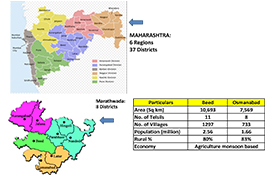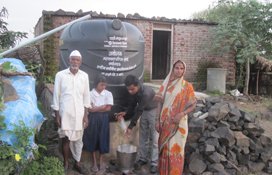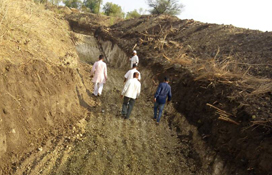Marathwada Region (Beed & Osmanabad Districts)
Background

Marathwada has been reeling under drought condition since 2012. The region had faced several droughts in the past. It is a landlocked region dependent on South West monsoon. The rivers carry very little water as the summer approaches. All the reservoirs receive water during rainy season. Due to the failure of monsoon, many reservoirs are dry. No water can be supplied until next monsoon.
Along with surface water, underground water resource has also been affected. There is severe depletion in groundwater level in all the talukas. Primarily, farmers were using shallow groundwater. They were dependent on wells. With the acute shortage of rainwater in 2012-13, most of the wells went dry.
Because of this severe drought situation continuing for last four years, Marathwada became the graveyard of farmers. Total number of suicides crossed 4,000.
RSGS intervention
Being an Organization concerned with Rural issues, RSGS decided to put it’s foot in Marathwada in 2012 and commenced to work in Beed & Osmanabad districts. In a span of 3 years we started work in 95 villages with various initiatives and have established contacts in 400 villages through 2 full time resident representatives supported by local volunteers.
Our multiple Approach in Marathwada covered: Water management, Support to families of Farmers who committed Suicide, Organic Farming & productive techniques
Accomplishments during 2012-2015



Installed 450 Sintex storage tanks (2000 lit each) in 380 villages using Tanker service.
Provided Financial support for Education to Suicide affected children
Conducted Workshops on Cattle healthcare
Organized Farmers’ meets / workshops /training camps on Farming techniques, watershed management & Organic farming
Accomplishments during 2012-2015


Our access to the District with hand holding approach built up confidence among Farmers & Villagers as a result we had a remarkable success in Organic Farming using natural resources & limited water sources. The output of produce went up in the range of 25% to 50%
| S.No | Taluka | Villages Covered | Farmers Benefited | Farmland Area (acres) |
|---|---|---|---|---|
| 1 | Osmanabad | 8 | 27 | 27 |
| 2 | Umarga | 24 | 61 | 61 |
| 3 | Lohara | 9 | 21 | 21 |
| 4 | Tuljapur | 13 | 40 | 40 |
| 5 | Paranda | 5 | 7 | 20 |
| 6 | Bhum | 5 | 3 | 15 |
| 7 | Kalamb | 2 | 2 | 4 |
| 8 | Washi | 5 | 7 | 20 |
| Total | 71 | 168 | 208 |
Jalayukt Shivar Abhiyan ( Water Conservation Drive)










In 2015, Maharashtra Government launched the project "Jalyukt Shivar Abhiyaan“ to make Maharashtra a drought-free state by 2019. The project involves deepening and widening of canals, construction of cement and earthen stop dams, work on nullahs and digging of farm ponds. The project aims to make 5000 villages free of water scarcity every year.
Being already present in the Region, effective 2016, RSGS undertook these projects in select villages in close harmony with local villages, concerned farmers & local Authorities.
The Table in the next slide gives details of work accomplished in 7 villages providing water availability to 295 acres of Farm land and benefiting 314 farmers. The work involved Construction of New as well as repair of old Cement Concrete Weir / Gabion Dams, Removal of Garbage from the Canals, Deepening & Widening of Canals, Continuous and Contour Trenching. of Garbage from the Canals, Deepening & Widening of Canals, Continuous and Contour
| S.No | Tehsil | Village | Cost(Rs.) | Water Storage Copacity (Litres) | Water Storage Copacity (Litres) | Farmers Benefited |
|---|---|---|---|---|---|---|
| 1 | Osmanabad | Shelgaon, Tehsil Washi | 2,000,000 | 23,500,000 | 110 | 80 |
| 2 | Beed | Kumshi | 50,000 | 700,000 | 5 | 4 |
| 3 | Beed | Jeba Pimpri | 1,200,000 | 103,500,000 | 80 | 70 |
| 4 | Beed | Aher Wadgaon | 950,000 | 630,000,000 | 50 | 80 |
| 5 | Beed | Kanadi Badan | 180,000 | 1,680,000 | 10 | 20 |
| 6 | Beed | Dighol Amba | 160,000 | 3,000,000 | 10 | 20 |
| 7 | Beed | Dipedgaon | 350,000 | 6,250,000 | 30 | 40 |
| Total | 4,890,000 | 768,630,000 | 295 | 314 |



